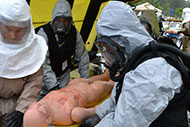ASHE initiative targets hospital power safety during critical events
The American Society for Healthcare Engineering and Powered for Patients are working together on a new project that addresses backup power in hospitals. The Health Care Leadership Initiative on Maintenance of Power will cover four topics:
- Create dialogue around the role of hospitals and other health care facilities in maintaining power.
- Address questions of how cogeneration and microgrid technologies fit into strategies for maintaining power.
- Explore how health facilities can allocate limited resources for needed investments in nonrevenue-generating backup power systems and investments in revenue-generating equipment
- Provide resources to help spur further action around power maintenance best practices
Powered for Patients, formed in the aftermath of Hurricane Sandy, works closely with public health preparedness leaders, emergency managers, utility providers, health care facility managers and the power-generation industry to help safeguard backup power and expedite restoration for critical health care facilities.
Several sessions at ASHE’s 2016 International Summit & Exhibition on Health Facility Planning, Design & Construction will serve as a platform for discussions on the topic.
Olympus validates updated duodenoscope reprocessing instructions
Olympus Corp. of the Americas has issued updated, validated manual reprocessing instructions for the TJF-160F and TJF 160VF duodenoscope models to replace those provided in the original device labeling. The Food and Drug Administration reviewed the updated reprocessing instruction and the validation data and determined that they meet its expectations.
The updated reprocessing instructions for the 160F/VF models include a more rigorous protocol for pre-cleaning, manual cleaning and high-level disinfection procedures.
Study: Quarter of acute care patients have MDRO on hands after hospital transfer
One in four seniors have superbugs on their hands upon transferring to an acute care facility after a hospital stay, according to a new study. Published in JAMA Internal Medicine, the study focused on 357 patients who were admitted to several post-acute care facilities in southeast Michigan. Nearly a quarter of the patients had at least one multidrug-resistant organism on their hands upon check-in. Researchers tested the same patients after two weeks and then monthly for up to six months or until discharge. Follow-up tests showed that not only did these organisms persist, but even more seniors acquired superbugs on their hands.
Study looks at bacterial biofilms in hospital water pipes
Researchers from the Environmental Protection Agency and the Georgia Institute of Technology studied biofilm communities in hospital water pipes. The team published a paper in Applied and Environmental Microbiology stating that some of the biofilm shows genes that could indicate pathogenic characteristics, but could not say yet if these bacteria pose a threat to hospital patients. The team says it will continue its research to learn more about potential health implications.





